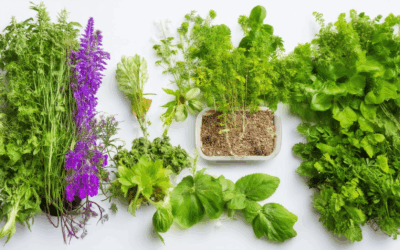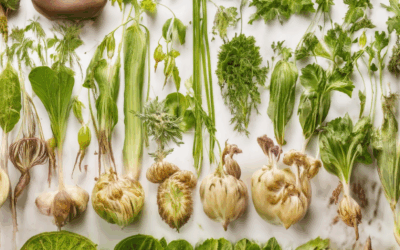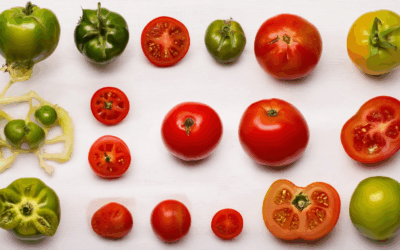Gardening organically is a rewarding way to grow your plants while maintaining environmental health, but one of the most challenging aspects can be managing plant diseases effectively. Whether you’re tending to a vegetable garden, a lush lawn, or a vibrant bouquet of roses, diseases can quickly undermine your efforts, causing wilting, discoloration, and even plant death. Traditional chemical treatments often come with harmful side effects and environmental impacts, which is why many gardeners are turning to organic methods for disease control. In this comprehensive guide, we’ll explore proven strategies to identify, prevent, and treat plant diseases naturally, ensuring your garden thrives year after year. From understanding the signs of common diseases to implementing preventative measures and discovering natural remedies, this article provides everything you need to master organic disease control and maintain a healthier, more resilient garden ecosystem.
Key Takeaways
– Boost soil health and plant resilience by incorporating compost to introduce beneficial microorganisms and improve nutrient availability.
– Maintain optimal soil conditions with mulching to retain moisture, regulate temperature, and suppress weeds, creating an unfavorable environment for diseases.
– Select disease-resistant plants to reduce reliance on chemical interventions and enhance natural defense mechanisms.
– Rely on organic alternatives like compost and natural pesticides instead of synthetic fertilizers and pesticides to protect your garden ecosystem.
– Use companion plants to deter pests and diseases, such as marigolds, which release compounds that repel harmful organisms.
– Optimize soil pH to ensure it supports plant health and discourages disease development.
– Practice strict sanitation to clean tools and pruning shears after use and remove infected plant parts to prevent disease spread.
– Introduce biological controls like ladybugs to manage pest populations that may carry diseases.
– Rotate crops to break disease cycles, as many pathogens prefer specific host plants.
– Regularly monitor and address issues promptly to minimize damage and prevent the spread of diseases in your garden.
By implementing these strategies, gardeners can effectively control plant diseases while maintaining ecological balance and promoting sustainable gardening practices.
Effective Organic Methods for Controlling Plant Diseases
Controlling plant diseases organically requires a combination of preventive measures, proper plant care, and sustainable practices. Here are some proven methods to safeguard your plants and promote their health:
Crop Rotation
Crop rotation is a simple yet highly effective method. By rotating crops annually, you allow the soil to recover and reduce the likelihood of disease buildup. This practice also enhances soil fertility and biodiversity, creating a healthier environment for your plants.
Companion Planting
Planting companions can naturally deter pests and diseases. For example, garlic and onions repel aphids and nematodes, while marigolds discourage pests like aphids and whiteflies. Incorporate these plants into your garden for a natural defense system.
Improve Soil Health
A healthy soil ecosystem is essential for strong, disease-resistant plants. Add compost or manure to introduce beneficial microorganisms that fight off pathogens. Regularly aerate the soil to enhance airflow and reduce moisture buildup, which is often a breeding ground for diseases.
Select Disease-Resistant Varieties
When selecting plants, choose varieties known for their resistance to common diseases. Seed catalogs and local nurseries often offer these options, which can significantly reduce the risk of infection and improve plant longevity.
Prune and Clean Up
Regularly prune plants to remove diseased branches and deadwood. Clean up fallen leaves and debris, as these can harbor spores. Avoid overhead watering to keep leaves dry, which is unfavorable for many pathogens.
Use Biological Controls
Introduce natural predators like ladybugs or parasitic wasps to control pest populations. These organisms reduce the need for harmful chemicals and contribute to a balanced ecosystem.
Fertilize Wisely
Over-fertilizing can lead to excessive foliage growth, attracting pests. Opt for slow-release fertilizers that provide consistent nutrition without encouraging rapid plant growth, which can stress plants and make them more susceptible to diseases.
Avoid Chemicals When Possible
Minimize the use of synthetic pesticides and herbicides. Instead, rely on integrated pest management (IPM) techniques that combine cultural, biological, and mechanical methods to control pests and diseases.
By adopting these organic methods, you can create a healthier garden environment that promotes plant resilience and sustainability. For more detailed guidance on each technique, explore our comprehensive gardening resources at Old Seed .
Effective Organic Methods for Controlling Plant Diseases
Controlling plant diseases organically requires a combination of preventive measures, proper plant care, and sustainable practices. Here are some proven methods to safeguard your plants and promote their health:
Crop Rotation
Crop rotation is a simple yet highly effective method. By rotating crops annually, you allow the soil to recover and reduce the likelihood of disease buildup. This practice also enhances soil fertility and biodiversity, creating a healthier environment for your plants.
Companion Planting
Planting companions can naturally deter pests and diseases. For example, garlic and onions repel aphids and nematodes, while marigolds discourage pests like aphids and whiteflies. Incorporate these plants into your garden for a natural defense system.
Improve Soil Health
A healthy soil ecosystem is essential for strong, disease-resistant plants. Add compost or manure to introduce beneficial microorganisms that fight off pathogens. Regularly aerate the soil to enhance airflow and reduce moisture buildup, which is often a breeding ground for diseases.
Select Disease-Resistant Varieties
When selecting plants, choose varieties known for their resistance to common diseases. Seed catalogs and local nurseries often offer these options, which can significantly reduce the risk of infection and improve plant longevity.
Prune and Clean Up
Regularly prune plants to remove diseased branches and deadwood. Clean up fallen leaves and debris, as these can harbor spores. Avoid overhead watering to keep leaves dry, which is unfavorable for many pathogens.
Use Biological Controls
Introduce natural predators like ladybugs or parasitic wasps to control pest populations. These organisms reduce the need for harmful chemicals and contribute to a balanced ecosystem.
Fertilize Wisely
Over-fertilizing can lead to excessive foliage growth, attracting pests. Opt for slow-release fertilizers that provide consistent nutrition without encouraging rapid plant growth, which can stress plants and make them more susceptible to diseases.
Avoid Chemicals When Possible
Minimize the use of synthetic pesticides and herbicides. Instead, rely on integrated pest management (IPM) techniques that combine cultural, biological, and mechanical methods to control pests and diseases.
By adopting these organic methods, you can create a healthier garden environment that promotes plant resilience and sustainability. For more detailed guidance on each technique, explore our comprehensive gardening resources at Old Seed .
Effective Organic Plant Disease Control
Controlling plant diseases organically involves a combination of strategies that promote plant health and deter pests naturally. Here’s a step-by-step guide to achieving successful organic disease control:
- Crop Rotation : Prevent the buildup of pests and diseases by rotating crops annually. For example, grow tomatoes one season, followed by peppers or squash the next, to break disease cycles.
- Companion Planting : Enhance your garden’s ecosystem by planting companion plants that deter pests. Basil near tomatoes, nasturtiums as traps for pests, and marigolds to repel aphids are effective choices.
- Neem Oil Spray : Apply neem oil solution to affected plants to combat fungal and bacterial infections. Neem is safe for plants and edibles when used appropriately, typically every 7-14 days depending on severity.
- Healthy Soil Management : Incorporate compost and manure to enrich soil, boosting plant resilience. Regularly aerate the soil to improve drainage and reduce disease risk.
- Natural Fungicides : Use garlic and onion extracts as natural fungicides. Mix a few drops of extract with water and apply to affected areas, following application guidelines to avoid harm.
- Soil Health Monitoring : Test your soil’s pH level and ensure it drains well to avoid waterlogging, which can encourage disease growth. Adjust pH as needed based on test results.
- Beneficial Insects : Attract ladybugs and other beneficial insects by planting flowers like calendula and sunflowers. These insects help control pest populations naturally.
- Disease-Resistant Varieties : Choose seeds and plants bred for disease resistance to minimize issues. Check for resistant varieties suited to your climate and growing conditions.
- Avoid Overwatering : Water deeply but less frequently to prevent fungal diseases. Proper drainage reduces the risk of root rot and other fungal issues.
By integrating these organic methods, you can maintain a healthy, thriving garden while protecting your plants from diseases without resorting to synthetic chemicals.
Best Organic Methods for Controlling Plant Diseases
Controlling plant diseases organically involves a combination of strategies that promote plant health, maintain soil integrity, and encourage natural resistance. Here are some effective methods:
- Composting: Enhance soil health by adding compost, which introduces beneficial microorganisms and improves nutrient availability. This strengthens plants’ natural defenses against diseases.
- Mulching: Apply organic mulch to retain moisture, regulate temperature, and suppress weeds, creating an environment less favorable to disease-causing pathogens.
- Resistant Varieties: Choose plants with genetic traits that make them less susceptible to common diseases. This reduces reliance on chemical interventions.
- Avoiding Chemical Inputs: Refrain from using synthetic fertilizers and pesticides, as they can disrupt ecosystems and increase disease risks. Opt for organic alternatives like compost and natural pesticides.
- Companion Planting: Grow plants that repel pests and diseases. Examples include marigolds, which release compounds that deter harmful organisms.
- Soil Preparation: Test and adjust soil pH levels to ensure they support plant health. Proper soil conditions discourage disease development.
- Sanitation Practices: Clean tools and pruning shears after use to prevent disease transmission. Regularly remove infected plant parts to limit spread.
- Natural Predators: Introduce biological control agents like ladybugs to manage pest populations that may carry diseases.
- Crop Rotation: Rotate crops to break disease cycles, as many pathogens prefer specific host plants.
- Monitoring and Early Intervention: Regularly inspect plants for signs of disease and address issues promptly to minimize damage and spread.
By integrating these methods, gardeners can effectively control plant diseases while maintaining ecological balance and promoting sustainable practices.
Best Organic Methods for Controlling Plant Diseases
Controlling plant diseases organically involves a combination of strategies that promote plant health, maintain soil integrity, and encourage natural resistance. Here are some effective methods:
- Composting: Enhance soil health by adding compost, which introduces beneficial microorganisms and improves nutrient availability. This strengthens plants’ natural defenses against diseases.
- Mulching: Apply organic mulch to retain moisture, regulate temperature, and suppress weeds, creating an environment less favorable to disease-causing pathogens.
- Resistant Varieties: Choose plants with genetic traits that make them less susceptible to common diseases. This reduces reliance on chemical interventions.
- Avoiding Chemical Inputs: Refrain from using synthetic fertilizers and pesticides, as they can disrupt ecosystems and increase disease risks. Opt for organic alternatives like compost and natural pesticides.
- Companion Planting: Grow plants that repel pests and diseases. Examples include marigolds, which release compounds that deter harmful organisms.
- Soil Preparation: Test and adjust soil pH levels to ensure they support plant health. Proper soil conditions discourage disease development.
- Sanitation Practices: Clean tools and pruning shears after use to prevent disease transmission. Regularly remove infected plant parts to limit spread.
- Natural Predators: Introduce biological control agents like ladybugs to manage pest populations that may carry diseases.
- Crop Rotation: Rotate crops to break disease cycles, as many pathogens prefer specific host plants.
- Monitoring and Early Intervention: Regularly inspect plants for signs of disease and address issues promptly to minimize damage and spread.
By integrating these methods, gardeners can effectively control plant diseases while maintaining ecological balance and promoting sustainable practices.
Effective Organic Methods for Controlling Plant Diseases
Controlling plant diseases organically requires a combination of prevention, maintenance, and awareness. Here are some proven methods:
- Crop Rotation : Rotate crops to avoid disease buildup. Different plants deplete various nutrients, allowing the soil to recover and breaking disease cycles.
- Companion Planting : Grow plants that deter pests and diseases. For example, marigolds can repel pests, while certain herbs may enhance soil health.
- Resistant Varieties : Choose plants bred for disease resistance. These varieties are less likely to succumb to common diseases.
- Composting : Incorporate compost into the soil to boost beneficial microorganisms that can suppress pathogens.
- Sanitation : Clean up fallen leaves and prune plants regularly to remove places where diseases can overwinter.
- Soil Preparation : Test and adjust soil pH to ensure it’s optimal for your plants. Proper nutrient balance can strengthen their defenses.
- Organic Fungicides : Use products like copper sulfate or neem oil to treat specific issues without harming the environment.
- Biodiversity : Maintain a diverse garden to attract predators of pests, reducing disease spread.
- Avoid Overwatering : Ensure plants have well-drained soil to prevent root rot, a common disease caused by excessive moisture.
By combining these methods, you can maintain a healthier garden ecosystem and reduce the impact of plant diseases naturally.








0 Comments